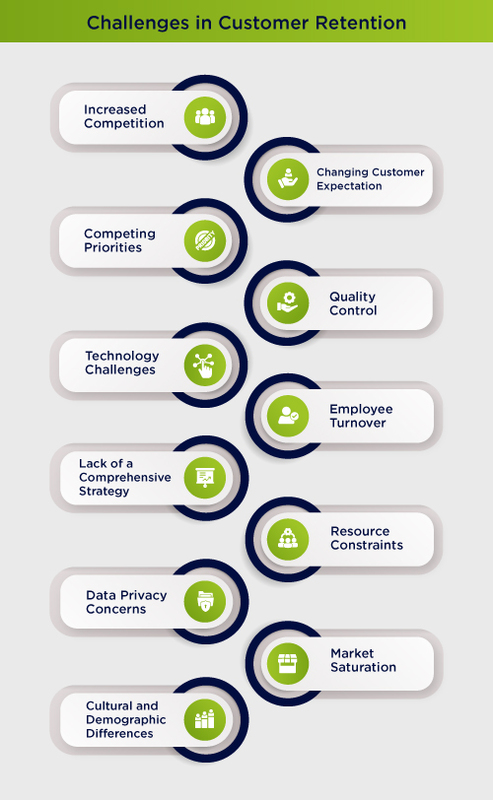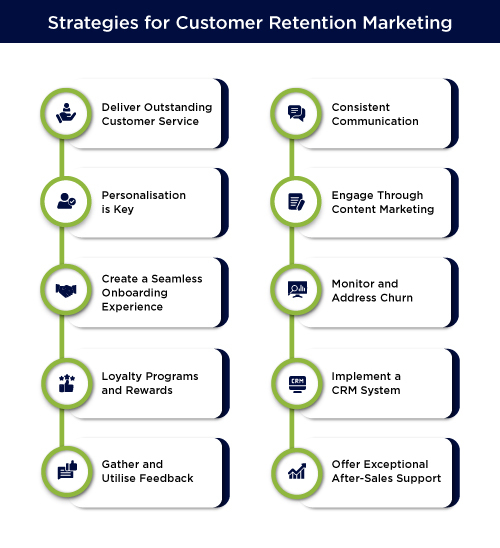Introduction
Customer retention is a cornerstone of sustainable success in today’s fiercely competitive market. But what exactly is customer retention, and why should it be a top priority for businesses of all sizes?
Customer retention refers to the strategies and efforts businesses employ to retain their existing customers over an extended period. It is nurturing and maintaining a strong, ongoing relationship with clients beyond their initial purchase. The importance of customer retention cannot be overstated. Not only is it more cost-effective to retain existing customers than to acquire new ones, but loyal customers also tend to spend more and become advocates for your brand.
In this blog, we’ll delve into customer retention, exploring strategies businesses can implement to foster lasting customer relationships and their vital role in achieving long-term success.
Challenges in Customer Retention

Customer retention is essential for the long-term success of any business, but it comes with its own set of challenges. Understanding and addressing these challenges is crucial for maintaining strong, lasting customer relationships.
Here are some common challenges in customer retention:
-
Increased Competition:
-
Changing Customer Expectations:
-
Competing Priorities:
-
Quality Control:
-
Technology Challenges:
-
Employee Turnover:
-
Lack of a Comprehensive Strategy:
-
Resource Constraints:
-
Data Privacy Concerns:
-
Market Saturation:
-
Cultural and Demographic Differences:
In today’s global marketplace, customers have many choices. The availability of alternatives makes it challenging to retain customers who competitors’ offers may entice.
Customer expectations are continually evolving. Keeping up with these changing expectations, especially regarding service quality and personalisation, can be challenging.
Businesses often have competing priorities, such as acquiring new customers or launching new products. Balancing these priorities with customer retention efforts can be challenging.
Maintaining consistent product or service quality can be difficult as a business grows. Inconsistencies can lead to dissatisfaction and customer churn.
Outdated or poorly integrated technology can hinder your ability to track and manage customer interactions effectively.
High employee turnover, especially in customer-facing roles, can disrupt the continuity of customer relationships and service quality.
Many businesses lack a well-defined customer retention strategy. Without a clear plan, efforts can become ad hoc and ineffective.
Smaller businesses may lack the resources needed to invest in advanced customer retention tools and technologies.
Increasing concerns about data privacy and security require businesses to handle customer data with care and transparency.
In mature markets, where most potential customers have already been acquired, customer retention becomes even more critical as the focus shifts from acquisition to maintaining market share.
Understanding and catering to the cultural and demographic differences of your customer base can be challenging, especially for global brands.
Strategies for Customer Retention Marketing

-
Deliver Outstanding Customer Service:
-
Personalisation is Key:
-
Create a Seamless Onboarding Experience:
-
Loyalty Programs and Rewards:
-
Gather and Utilise Feedback:
-
Consistent Communication:
-
Engage Through Content Marketing:
-
Monitor and Address Churn:
-
Implement a CRM System:
-
Offer Exceptional After-Sales Support:
Exceptional customer service is the foundation of customer retention. Ensure that your support team is well-trained, responsive, and empathetic. Address customer concerns promptly and exceed their expectations whenever possible.
According to a report by McKinsey & Company, 71% of customers expect personalisation, and 76% get frustrated when they don’t find it. So, tailor your customer interactions based on their preferences and purchase history. Personalised emails, recommendations, and offers demonstrate that you value their individual needs.
Make the onboarding process for new customers as smooth as possible. Provide clear instructions, welcome messages, and access to helpful resources to get them started on the right foot.
Implement loyalty programs that incentivise repeat purchases. Reward loyal customers with discounts, exclusive access, or early product releases. The feeling of being appreciated can foster strong customer loyalty.
Actively seek feedback from customers about their experiences with your products or services. Use this feedback to make improvements and demonstrate that you value their input.
Keep customers informed about relevant updates, promotions, and new offerings through regular and consistent communication. Email marketing, newsletters, and social media are valuable tools for staying connected.
Create and share valuable content that educates, entertains, and engages your audience. Content marketing can position your brand as an industry leader and keep customers returning for more insights.
Keep a close eye on customer churn rates. Identify patterns and reasons for customers leaving and proactively address these issues.
A CRM system can help you manage and track customer interactions, preferences, and history. It enables personalised communication and helps in understanding individual customer needs.
Continue to provide support and assistance even after the sale. This ensures that customers feel valued and supported throughout their entire journey with your brand.
Conclusion
Customer retention is the lifeblood of any successful business. By implementing strategies to nurture and maintain strong relationships with existing customers, you can boost customer loyalty, increase revenue, and position your brand for long-term success. Remember, retaining a customer is not just about the initial sale; it’s about building a lasting relationship.
While attracting new customers is important, retaining existing customers is far more critical. At Amura, we have empowered a plethora of businesses in not only securing new customers but also retaining existing ones through our growth marketing solutions. As one of the leading B2B marketing agencies, we’ve helped clients like Glenmark, Cummins, Castrol, Tork Motors, Hyundai Construction Equipment, Bank of Baroda and an assortment of others through data-driven analysis and creative campaigns to reach their marketing goals.
